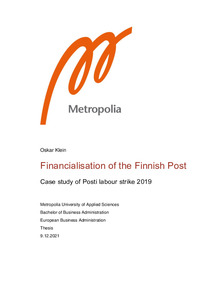Financialisation of the Finnish Post : case study of Posti labour strike 2019
Klein, Oskar (2021)
Klein, Oskar
2021
All rights reserved. This publication is copyrighted. You may download, display and print it for Your own personal use. Commercial use is prohibited.
Julkaisun pysyvä osoite on
https://urn.fi/URN:NBN:fi:amk-2021122990597
https://urn.fi/URN:NBN:fi:amk-2021122990597
Tiivistelmä
This thesis studies the 2019 Posti labour strike from the viewpoint of financialisation. Financialisation as a phenomenon is described as the increase of the importance of finance and the shift in corporate governance to maximise shareholder returns. The Posti labour strike has features that are often linked to financialisation. To determine whether financialisation could be a causal factor in the event a qualitative case study of Posti’s developments was conducted. Material used in the study was gathered from government policy releases and studies, news articles, and financial statements and reports of Posti.
Case study revealed that while Posti’s financial business activities had not
increased, its management was driven to weaken labour bargaining power and lower labour costs while simultaneously increasing executive compensation. Change towards these activities stemmed from political decision making, which had slowly transitioned towards neoliberal market-oriented policies. At the same time the collective bargaining structure that guided Finnish labour market conditions had weakened, which enabled Posti to pursue radical cost cutting actions. Financial data of Posti shows that there is no indication that increased executive compensation would reflect the performance of the company and that incentive structures that are in place are ineffective.
The conclusion of the study is that factors that contributed to the events leading to the labour strike can be linked to financialisation. Increased financialisation of Posti is most likely caused by a political shift towards neoliberal policies, which enabled other development.
Case study revealed that while Posti’s financial business activities had not
increased, its management was driven to weaken labour bargaining power and lower labour costs while simultaneously increasing executive compensation. Change towards these activities stemmed from political decision making, which had slowly transitioned towards neoliberal market-oriented policies. At the same time the collective bargaining structure that guided Finnish labour market conditions had weakened, which enabled Posti to pursue radical cost cutting actions. Financial data of Posti shows that there is no indication that increased executive compensation would reflect the performance of the company and that incentive structures that are in place are ineffective.
The conclusion of the study is that factors that contributed to the events leading to the labour strike can be linked to financialisation. Increased financialisation of Posti is most likely caused by a political shift towards neoliberal policies, which enabled other development.
